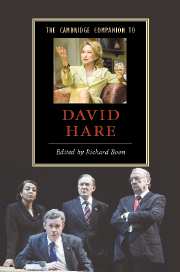Book contents
- Frontmatter
- Introduction
- Part I Text and context
- 1 Portable Theatre: ‘fine detail, rough theatre’
- 2 Keeping turning up
- 3 In opposition
- 4 Hare’s trilogy at the National
- 5 Hare’s ‘stage poetry’, 1995-2002
- 6 ‘Stopping for lunch’
- Part II Working with Hare
- Part III Hare on screen
- Part IV Overviews of Hare
- Selected Bibliography
- Index
2 - Keeping turning up
Hare’s early career
from Part I - Text and context
Published online by Cambridge University Press: 28 April 2008
- Frontmatter
- Introduction
- Part I Text and context
- 1 Portable Theatre: ‘fine detail, rough theatre’
- 2 Keeping turning up
- 3 In opposition
- 4 Hare’s trilogy at the National
- 5 Hare’s ‘stage poetry’, 1995-2002
- 6 ‘Stopping for lunch’
- Part II Working with Hare
- Part III Hare on screen
- Part IV Overviews of Hare
- Selected Bibliography
- Index
Summary
A war. If only there were a war in England, not that endless - slow, sullen defeat. Why don't the bastards take up arms against such a government? Then we poets would be of some use, we'd do the songs, the banners, the shouts...
Howard Brenton, Bloody Poetry, 1984'British society needs not to abolish its institutions, but to refresh them. For, if not through institutions, how do we express the common good?' So wrote David Hare in conclusion to the Introduction of his 1993 book Asking Around, in which he provides an account of the mass of research out of which he produced the trilogy of plays - Racing Demon, Murmuring Judges and The Absence of War - which was for some the signal theatrical event of the 1990s. These were plays in which, through a forensic dissection of the operations of the Church, the Law and the Labour Party respectively, Hare offered a panoramic and fiercely critical view of the state of the nation in the (as it turned out) final years of a period of Conservative government that had begun in 1979 with the election of Margaret Thatcher as Prime Minister of Great Britain. Taken as a whole, they present a picture of a divided country run by an intellectual elite, inward-looking, self-regarding and concerned only with the preservation of its own power and status; an elite that has surrendered moral leadership and social responsibility to the vagaries of market-force economics. The institutions over which it presides, insofar as they function at all, do so only because of the continuing goodwill and hard work of those isolated individuals, usually at or near the bottom of the pile, who 'do the dirty work'. As a character in Murmuring Judges puts it, 'Let's hear it for the guys who keep turning up' (p78).
- Type
- Chapter
- Information
- The Cambridge Companion to David Hare , pp. 31 - 48Publisher: Cambridge University PressPrint publication year: 2007
- 1
- Cited by

